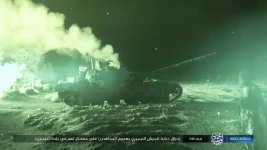- Views: 871
- Replies: 17

In the aftermath of the recent Israeli airstrikes and Iran's retaliatory response, a battle of narratives emerges with both sides claiming victory. Israel emphasizes its military-technical achievements, while Iran celebrates a political triumph centered on restoring deterrence. A deeper analysis of the events reveals a complex tapestry of military capabilities, geopolitical maneuvering, and strategic calculations.
Israel's declaration of success rests on its ability to destroy incoming threats, including drones, cruise missiles, and a significant portion of ballistic missiles. Employing a formidable anti-ballistic missile defense system, bolstered by support from the US Navy and allied forces, Israel demonstrated its military might. Yet, the breach at Nevatim airbase highlights the limitations of even the most advanced defense systems and the ongoing threat posed by Iranian aggression.
Iran views its retaliation as a political win aimed at restoring deterrence against repeated Israeli incursions into Syrian territory. By launching a substantial counterattack, timed to coincide with international military activity, Iran sends a strong message of resolve. Forcing the involvement of multiple allies to counter the assault underscores Iran's ability to challenge Israeli aggression while avoiding a full-scale conflict.
Crucially, these events emphasize the interconnected nature of regional dynamics, with the United States playing a pivotal role. President Biden's caution for Israel to “take the win” reveals a delicate balance of power and interests. This statement carries an implicit warning that unilateral escalation could jeopardize US support, pushing Israel away from aggressive actions against Iran.
The international community's response, urging restraint and diplomatic solutions, further underlines the gravity of the situation. Israeli Prime Minister Netanyahu faces mounting pressure to avoid actions that could instigate further conflict. Iran's willingness to respond to future provocations reinforces the fragility of the current situation and the urgent need for de-escalation.
At the core of the issue lies Israel's bombing of Iran's consulate in Syria– a transgression of international law that set off the chain of events leading to this tense standoff. Iran's calculated response, calibrated to trigger foreign intervention, reflects a sophisticated understanding of geopolitical dynamics and strategic needs.




